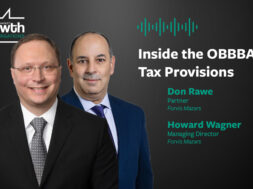Middle-Market Public Policy Roundup
A House bill is expected to ease PPP restrictions, a small business investor group warns Congress of COVID-19's knock-on effects, and the SEC changes a rule on financial reporting.

In this week’s roundup, we look at a bill that is expected to ease the restrictions on companies that receive loans through the Small Business Administration’s Paycheck Protection Program. In addition, we provide a summary of a House subcommittee hearing where a small business investor group warned of the knock-on effects of COVID-19 and how private capital can help, and a rule change from the Securities and Exchange Commission that will allow investors to report financial information more easily.
Lawmakers to Ease PPP Rules
Lawmakers are expected to consider up to eight bills during a House floor vote today, one of which would adjust a key ratio in a COVID-19 relief program that enjoys wide bipartisan support.
Among the bills being considered is the Paycheck Protection Flexibility Act, which would lower the portion of loans that must be used for payroll from the Small Business Administration’s Paycheck Protection Program from 75% to 60%, in addition to giving borrowers more time to use any loans.
The bill would also eliminate the existing two-year loan repayment restrictions for future borrowers, allow payroll tax deferment for PPP recipients, and extend the rehiring deadline for another 24 weeks. The deadline is currently set for June 30.
The bill was originally proposed by Texas Republican Chip Roy and Minnesota Democrat Dean Phillips earlier this month and has since gained wide bipartisan approval in the House, with 35 lawmakers from both parties co-sponsoring the legislation. More than 50 industry groups also voiced their support of the bill.
Both lawmakers said the PPP program has been instrumental in keeping businesses from the brink, but the program didn’t go far enough in the wake of the coronavirus pandemic.
“I hear from far too many business owners that the program, as it stands, needs changes to make it work for them. I don’t want to see another local institution go out of business because Congress is more focused on politics than helping Americans who need it,” Roy said in a statement along with Phillips on Wednesday.
Earlier drafts of the legislation were much more radical in their approach to amending the PPP program, with the initial proposal slashing the requirement that 75% of loans must go toward payroll to 25%. Treasury Secretary Steven Mnuchin said last week that the requirement should stay at 75%, indicating an apparent compromise between the lawmakers and the Treasury.
If passed, the legislation will proceed to the Senate where it may face similar bipartisan support.
Another PPP-related bill is also expected to be taken up by the House today. The Small Business Transparency and Reporting for the Underbanked and Taxpayers at Home Act, or the TRUTH Act, which was also introduced by Phillips, would require the SBA to publish more data about the loans, including borrower names and amounts.
Briefs
OCC Selects Acting Comptroller
Comptroller of the Currency Joseph Otting today announced that he will step down from his position on May 29, and the Treasury has chosen his replacement.
Treasury Secretary Steven Mnuchin selected First Deputy Comptroller and Chief Operating Officer Brian Brooks to become the OCC’s acting head after an announcement last week.
“I am confident that Brian will lead the agency effectively during this challenging time,” Mnuchin said in a statement.
Brooks joined the OCC in April from Coinbase, Inc., a currency exchange company focusing on cryptocurrencies, where he served as chief legal officer since 2018.
As the effects of the coronavirus pandemic persist, policymakers were worried that the PPP might run out of funding like it had in late April, but borrowing from the program has seen a slight decline in recent weeks. Figures from the SBA last week showed the agency had approved more than $513 billion in loans since March. This week, that number fell to $511 billion.
Despite some signs of improvement, a study from the University of Illinois, Harvard Business School, Harvard University and the University of Chicago estimated that more than 100,000 small businesses have closed since the start of the coronavirus pandemic in March, now equaling the number of Americans who have died as a result of the disease.
According to Department of Labor figures released Thursday, 2.1 million people applied for unemployment insurance, raising the number of workers who have lost jobs to 42 million.
Small Business Investor Group Says Private Capital Could Alleviate COVID-19’s Knock-on Effects
The head of an industry group representing lower middle-market private equity funds told members of Congress that small businesses will need more flexibility in order to adapt to the new environment, which includes improving access to capital.
Brett Palmer, the president of the Small Business Investor Alliance, appeared before a virtual hearing of the Subcommittee on Investor Protection, Entrepreneurship, and Capital Markets on Tuesday. The hearing focused on the impact of the COVID-19 pandemic on capital markets, warning of the disease’s knock-on effects.
“We need to remember that we are only experiencing the first wave of impacts of this economic and biological disaster,” he said. “There will be second and third wave impacts that we know are coming and a whole lot more that we don’t yet see.”
Palmer said a part of the government’s response in the next year must include an update to regulations that create barriers to capital for small and medium-sized businesses, which could face high levels of debt and limited access to loans from banks as credit wears thin despite their viability—and hamstring job growth.
Additional flexibility for the Paycheck Protection Program was one of the suggestions Palmer made to lawmakers in addition to helping small businesses get access to private capital.
“Small businesses are going to need even more access to more patient capital or equity,” he said. “They’ll need access to both bank loans and private capital markets, from business development companies, small business investment companies, rural business investment companies and small private equity [firms].”
SEC Adopts Amendments to Improve Financial Disclosures about Acquisitions of Businesses
The Securities and Exchange Commission announced last week that it has voted to adopt amendments to its rules and forms to improve for investors the financial information about acquired or divested businesses, facilitate more timely access to capital, and reduce the complexity and costs to prepare the disclosure.
The amendments will update the agency’s rules, which have not been comprehensively addressed since their adoption more than 30 years ago.\
“This action, which is designed to enhance the quality of information that investors receive while eliminating unnecessary costs and burdens, will benefit investors, registrants and the market more generally,” SEC Chairman Jay Clayton said in a statement.
The amendments to the rules are intended to assist business development companies improve the financial disclosure requirements by altering some definitions and criteria.
The amendments will be effective on Jan. 1, but voluntary compliance will be permitted in advance of the effective date.

Benjamin Glick is an associate editor of Middle Market Growth.


